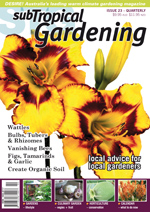Myrtle Rust (Uredo rangelii) The rust was first detected on the Central Coast of New South Wales in April 2010. How the rust fungus entered Australia is unknown. Myrtle rust belongs to a fungal complex collectively known as the guava rust group. This complex includes the fungus Puccina psidii which is a significant pathogen of the plant family Myrtaceae outside Australia.
Rust spores will germinate on a susceptible host plant only under certain conditions. Overseas, rusts in the guava rust group need high humidity or leaf wetness (for more than 6 hours), and temperatures of 15-25oC. Low light (darkness) for some hours after the spore has landed increases the likelihood of successful infection. It is quite likely that Myrtle rust will need similar environmental conditions. The rust pustules can mature and release infective spores in as little as 10-12 days.
Like other rust species, Myrtle rust produces a multitude of spores in the pustules. These may be carried to new host plants by wind, water splash, by insects such as bees (which may work on the spores on infected leaves), on equipment, or on clothing. The rust spores can be carried long distances by wind. Rust diseases can also spread through cuttings, plants and cut stems from infected plants.
The fungus can also survive on stock plants. Spores can survive for up to 3 months in the environment and on crop trash, if conditions are favourable.
Rusts are highly transportable. Their spores can be spread via contaminated clothing, infected plant material, on equipment and by insect movement and wind dispersal. These types of rust affect commercial plant growing operations and native ecosystems. They typically attack young plants and new growth on established plants and can be controlled in commercial operations with the use of fungicides.
Control Methods:
Strategies for both home gardens and businesses can be found here – http://www.dpi.qld.gov.au/4790_20154.htm
Main products are copper, mancozeb or triforine fungicides – http://permits.apvma.gov.au/PER12828.PDF
EXTRAS
Queensland Admits It Cannot Win – http://www.abc.net.au/rural/news/content/201102/s3148858.htm
Updated list of infected plants.
Exotic Plant Pest Hotline on 1800 084 881.
QLD Govt + update
NSW PrimeFactWA Dept Agric
NT Govt
Federal Environment
CSIRO
Aust Plant Pathology Society

